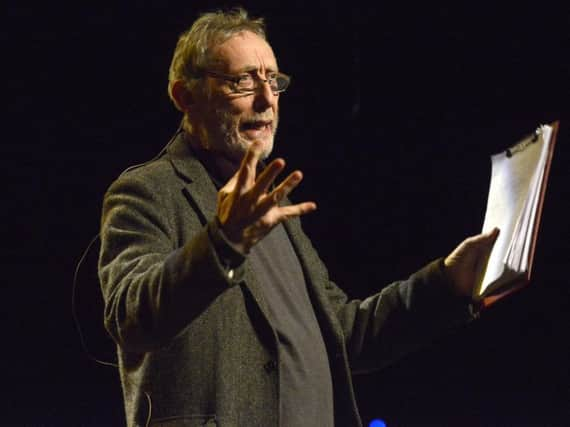Why I stand with Sacha Baron Cohen, David Baddiel and Michael Rosen and why Holocaust denial must be challenged - Anthony Clavane


His latest offering, The Missing, is a more serious affair. It is also about a hunt – for the relatives who disappeared in the German death camps.
Rosen, like the comedians Sacha Baron Cohen and David Baddiel, is Jewish. All three men, in their different ways, have been making audiences laugh for the past few decades.
Advertisement
Hide AdAdvertisement
Hide AdOn Monday, however, all humour will be put on hold as they commemorate one of the most important days in their religion’s calendar.
January 27 is not a religious festival, like Passover or Yom Kippur. It is, in fact, one of the most important days in the non-Jewish world’s calendar.
On Holocaust Memorial Day, the 75th anniversary of the liberation of Auschwitz will be remembered. As will the Nazis’ attempt to wipe out an entire group of people – and all non-Jews deemed to be racially and culturally inferior.
Remembering the genocide in Bosnia and beyondThis day seems more important than ever at a time when, according to Rosen, Baron Cohen and Baddiel, Holocaust denial is on the rise.
Advertisement
Hide AdAdvertisement
Hide AdRosen hadn’t planned to write a book about his family until he visited a school and a sixth-former, during a discussion on the gas chambers, told him: “None of this happened, did it?”
Despite being one of the
most-documented events in history, the Nazi genocide is, claim the deniers, a figment of our collective imagination. Some insist The Diary of Anne Frank is a forgery.
In one survey, five per cent of UK adults said they did not believe the genocide took place – and one in 12 thought its scale had been exaggerated. Almost 20 per cent believed fewer than two million Jews were murdered. The actual figure, of course, was six million – two thirds of Europe’s Jewish population.
Christa Ackroyd: Why we must never doubt the horrors of the HolocaustThis is why, a few months ago, Baron Cohen attacked Facebook’s refusal to remove Holocaust deniers from its platform. “We have millions of pieces of evidence,” he noted. “It is a historical fact. And denying it is not some random opinion. Those who deny the Holocaust aim to encourage another one.”
Advertisement
Hide AdAdvertisement
Hide AdIn a forthcoming BBC documentary on the antisemites who specialise in “exposés” of the “holohoax”, Baddiel will be asking the question: why does a desire to deny these events exist?
I have been asking myself the same question ever since the late 1980s when I read that the maverick historian David Irving claimed the gas chambers were a myth. Irving, who dismissed what happened at Auschwitz as “Disneyland”, was later labelled “anti-semitic and racist” by a judge during an infamous libel trial in 2000.
Escaping the Holocaust: One Yorkshire woman’s amazing storyThere are three good ways to shut down the deniers: education, education, education.
As a famous writer, Rosen has many opportunities to go into schools and colleges and put the record straight. “I see myself as a storyteller,” he told one interviewer. “And who do I tell stories to? Largely young people.”
Advertisement
Hide AdAdvertisement
Hide AdArek Hersh, a Holocaust survivor who now lives just outside Leeds, has been telling young people his story in schools and universities for many years now.
Arek was incarcerated in concentration camps from the age of 11 and every year organises a walk between the Auschwitz and Birkenau camps.
In three days’ time, his story will be one of many told by the BBC. To those who are already criticising the broadcaster’s coverage as over the top, it
is worth remembering two things.
Firstly, it comes at a time when European antisemitism, along with other racist and xenophobic forms of populism, is again rearing its ugly head on the continent.
Advertisement
Hide AdAdvertisement
Hide AdAnd secondly, in Monday night’s BBC2 The Windermere Children – a moving dramatisation of the real-life journey undertaken by 300 Jewish children to the Lake District to find new families – Arek is only 16 years old.
Which is only a year younger than the sixth-former who, after Rosen had detailed how his father’s uncles were rounded up in France and sent to Auschwitz, brazenly declared: “It didn’t happen.”